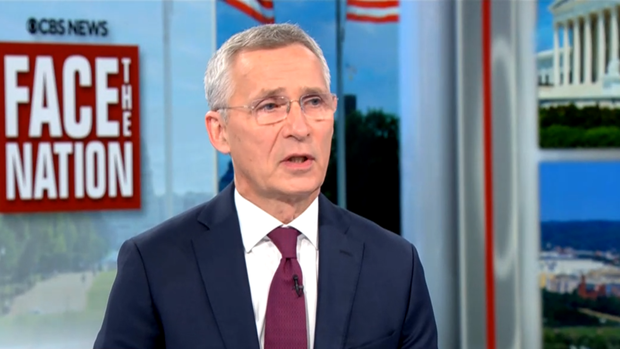Stoltenberg: Orbán’s visit to Moscow does not change NATO’s position
Washington — NATO Secretary General Jens Stoltenberg said Sunday that far-right Hungarian Prime Minister Viktor Orbán‘s trip to Moscow last week for talks with Russian President Vladimir Putin does not change NATO’s position on assistance to Ukraine despite Hungary being a member country of the alliance.
“Prime Minister Orbán… he made it clear when he came to Moscow that he didn’t go there on behalf of NATO, different NATO allies interact with Moscow in different ways,” Stoltenberg said Sunday on “Face the Nation.”
Hungary assumed the largely ceremonial role of the six-month rotating presidency of the EU on Monday, July 1. In less than a week, Orbán visited Ukrainian President Volodymyr Zelenskyy in Ukraine and launched the “Patriots for Europe” alliance with other right-wing nationalists, according to Reuters.
But on Friday, during a rare trip to Russia by a European leader, he also met with Putin, a meeting that came just days before a NATO summit in Washington, D.C. where the topic of providing further military aid to Ukraine will be at the forefront.

Despite other European officials condemning Orbán’s trip to Moscow, Stoltenberg emphasized the meeting doesn’t change NATO’s common goals of aiding Ukraine in the war launched by the Russian invasion.
“What matters for me is that all allies have agreed that we need to do more for Ukraine, both with this new training and assistance that NATO will provide to Ukraine, but also with the long term pledge,” he said on “Face the Nation. “And I also expect that by the summit that starts next week, allies will make new announcements on more air defense and more ammunition.”
Stoltenberg added that a main factor in NATO’s ability to make decisions on support to Ukraine is the common goal for peace.
“And the only way to get there is to convince President Putin that he will not win on the battlefield, he has to sit down and accept a solution where Ukraine prevails as a sovereign, independent nation in Europe,” Stoltenberg said. “The only way to convince Putin that he will not win on the battlefield is abroad military support to Ukraine. So a negotiated solution that is lasting for Ukraine requires military support to Ukraine.”
This week’s summit in Washington also comes as NATO allies have been bracing for possible Trump 2024 victory.
During former President Donald Trump’s first term as president, America’s allies were shocked by his open criticism of the failure of some NATO members to meet defense funding commitments, and the Trump campaign has said that calling on allies to increase their defense spending is a policy that a future Trump White House would aggressively pursue.
Trump said at a February campaign rally in South Carolina that he’d encourage Russia to “do whatever the hell they want” to NATO allies who don’t pay their fair share into the Western military alliance. Referring to a conversation with an unnamed leader of a NATO country who asked him, “If we don’t pay, are you still going to protect us,” Trump said he replied, “Absolutely not.”
The NATO Secretary General met with Mr. Biden in June at the White House ahead of this week’s summit. When asked Sunday of his personal assessment of Mr. Biden as an effective leader, Stoltenberg said their conversation was a positive one.
“We had a good-we had a productive meeting. And of course, there is no way to make these big decisions on how to further strengthen NATO, enlarge NATO, new members without having a strong US leadership,” he said.
- In:
- Jens Stoltenberg
- NATO


